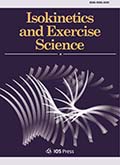Authors: Bostancı, Özgür | Kabadayı, Menderes | Mayda, Muhammet Hakan | Yılmaz, Ali Kerim | Yılmaz, Coşkun
Article Type:
Research Article
Abstract:
BACKGROUND: An enthusiasm for physical exercise is often developed in the paediatric age group through collective game-based sporting activities. Regular exercise via sports can create positive effects on the respiratory systems of boys as well as on their overall growth and development. To help identify deviations from positive trends in these areas, respiratory function tests have become an essential part of the diagnosis and assessment of pulmonary disease. OBJECTIVE: To investigate the effect of different types of sports on pulmonary functions and respiratory muscle strength and to help establish baseline reference values in healthy Turkish boys
…aged 8–12 years. METHODS: A total of 624 healthy boys, who train at least twice a week for football (128), basketball (105), archery (60), swimming (111) and wrestling (74), as well as 146 boys who do not perform regular physical activities voluntarily, participated in the study. To evaluate and potentially differentiate amongst the merits of these several sports, we obtained a variety of baseline measurements from our subjects, including forced vital capacity (FVC), forced expiratory volume in one second (FEV1), FEV1/FVC, maximal peak expiratory flow (PEF max), maximal voluntary ventilation (MVV), maximal inspiratory pressure (MIP) and maximal expiratory pressure (MEP). RESULTS: There were statistically significant differences amongst the types of sports regarding the various metrics we examined: FVC, FEV1, FEV1/FVC, PEF max, MVV, MIP and MEP (p < 0.05). The active boys showed higher mean values for pulmonary functions and respiratory muscle strength than the passive ones. Also, the wrestlers generally had better respiratory parameters than those of athletes in the other four sports we investigated. CONCLUSIONS: It was clear that exercise, especially regarding pulmonary function and respiratory muscle strength, produced better outcomes in the active boys compared with our control group of relatively passive boys. The mechanisms responsible for this difference are likely due to the resistance effect of exercise.
Show more
Keywords: Pulmonary functions, respiratory muscle strength, boys, exercise
DOI: 10.3233/IES-192105
Citation: Isokinetics and Exercise Science,
vol. 27, no. 4, pp. 307-312, 2019
Price: EUR 27.50





